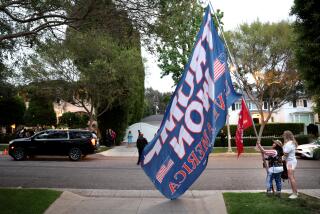Clinton Shows He Still Has Stuff to Woo Party Faithful
- Share via
NEW YORK — His name has been dragged through the mud of political scandal for a year. He was impeached six weeks ago. But, as a fund-raiser, President Clinton sparkles, continuing to bring in the big bucks--and little ones, too.
Over two portions of sea bass--at a luncheon in Boston and a dinner in New York--he exhorted the party faithful who turned out in sufficient numbers Tuesday, impeachment or not, and wrote checks large enough to boost the Democratic National Committee’s accounts by nearly $2 million.
And throughout, there was not a nod of presidential recognition to the impeachment trial in the Senate or to the deposition of Vernon E. Jordan Jr.--Clinton’s friend, advisor and golfing partner, and the man who tried to help Monica S. Lewinsky find a job.
The money the party raised Tuesday came from people paying $10,000 each to dine with the president. Like Willy Sutton, who robbed banks because that’s where the money was, Clinton is drawn to big cities--and largely Democratic communities at that--because that’s where the money is: places like Los Angeles and New York.
But those ponying up something less--say, no more than $100--are also surprising party fund-raisers with their willingness to keep the dollars flowing. Indeed, during the last month, just after the House impeached the president Dec. 19, a telephone and mail appeal directed at smaller contributors brought in $2 million.
That was twice what the party had forecast, spokeswoman Melissa Bonney Radcliff said. “If we’re reaching out to people saying we’ll fight for Social Security and education, and the only things the Republicans have put forward, their only agenda, is ‘impeach the president,’ it’s helping the [Democratic] party,” she said.
Reports filed recently by Democrats with the Federal Election Commission, she said, showed a 35% increase in receipts in 1998 over 1994, the most recent similar period in the election cycle. And contributions from those giving less than $100, she said, had grown 47% in that same period.
But Republican fund-raising efforts appear to be similarly successful. Tim Fitzpatrick, the deputy press secretary for the Republican National Committee, said that “small-dollar contributions from Joe and Jane Six-Pack” raised $3.1 million last month--largely in $15 and $20 checks.
If the Democrats claim, he said, “that impeachment has just opened up the cash registers and money is flowing in, they’re blowing smoke. For the period they raised $2 million, we brought in $4 million from the same sort of donor.”
The fund-raising luncheon Clinton attended Tuesday at a downtown Boston hotel honored Steve Grossman, the party’s chairman, who is leaving office in March. Later this month, the president plans to attend fund-raising events in Los Angeles and San Francisco.
For their dollars, the contributors were given fish, a smidgen of partisan rhetoric and a healthy dose of presidential back-patting, as Clinton sought to gin up support for the $1.77-trillion budget he unveiled Monday.
Between fund-raisers, Clinton visited the Jackson Mann Elementary School just minutes from downtown Boston, where he talked to children, their parents, teachers and local politicians.
In a gritty quarter known as Brighton in a city known for its concentration of top-quality institutions of higher learning, he dwelt on the more basic levels of education, warning that failure to improve the poorest-functioning schools will put a new generation of children at risk.
Clinton has made education a point of public focus as he seeks to demonstrate that the impeachment trial has not diverted his attention from what he considers the nation’s pressing domestic needs.
Clinton wants to require states and school districts to develop plans that would improve schools that demonstrate the lowest achievement. It would depend on intensive teacher training, classroom discipline and implementation of proven school reforms. If such a school did not improve within two years, authorities could permit students to attend other public schools, or they could close poor performing schools, and reopen them with entirely new staffs.
More to Read
Get the L.A. Times Politics newsletter
Deeply reported insights into legislation, politics and policy from Sacramento, Washington and beyond. In your inbox twice per week.
You may occasionally receive promotional content from the Los Angeles Times.










